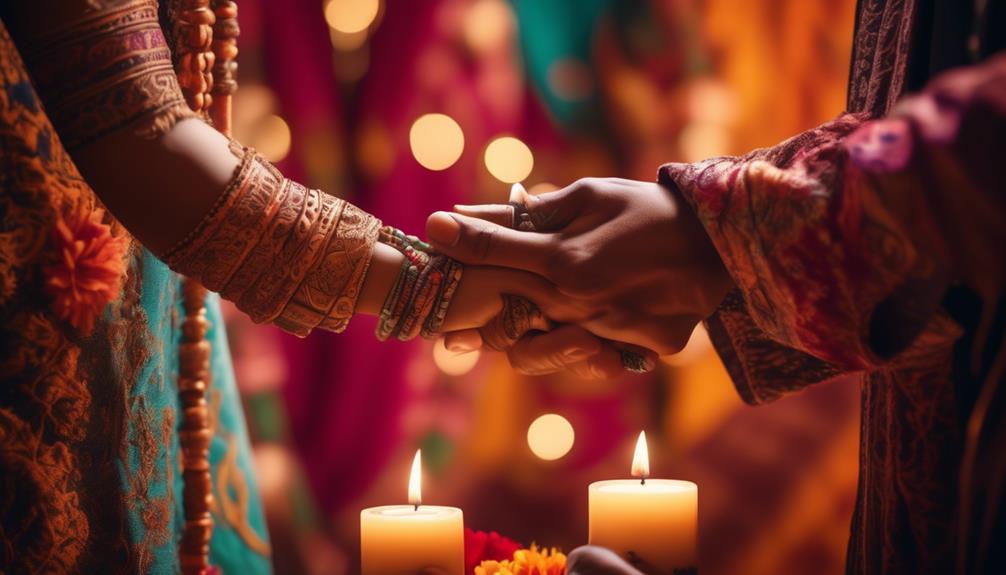Do These Practices to Honor Cultural Differences in Marriage

Practices for honoring cultural differences in marriage include actively embracing and celebrating diverse traditions and customs. By adopting these practices, couples can create a multicultural partnership that thrives on mutual understanding and appreciation.
This can lead to a stronger and more harmonious relationship.
Embrace Cultural Traditions
Embrace the richness and diversity of cultural traditions in your marriage to foster a deeper connection and understanding between you and your partner. Embracing cultural practices isn't just about incorporating a few rituals or traditions into your wedding ceremony; it goes beyond that. It requires a genuine appreciation and respect for the values, beliefs, and customs that shape your partner's cultural identity.
Cultural sensitivity is crucial in maintaining a harmonious and fulfilling marriage. It means being aware of and sensitive to the differences that exist between you and your partner, and actively seeking to understand and appreciate those differences. It requires open-mindedness, empathy, and a willingness to learn and grow together.
Communicate Openly About Cultural Values
You may think that communicating openly about cultural values in marriage is unnecessary or even uncomfortable. However, it's crucial to acknowledge that cultural values shape our beliefs, behaviors, and expectations.
By discussing and understanding each other's cultural values, you can foster respect, empathy, and compromise in your relationship.
Don't let cultural differences become a source of conflict, but rather an opportunity for growth and connection.
Cultural Values and Communication
Cultural values play a crucial role in marriage, and openly communicating about these values is essential for a successful and meaningful partnership. In a world that's becoming increasingly diverse, it's important to approach marriage with cultural sensitivity and embrace the differences that each partner brings.
Cross-cultural communication is the key to understanding and appreciating these differences. It involves actively listening, asking questions, and being open-minded. By engaging in honest and non-judgmental conversations about cultural values, you can create an environment where both partners feel valued and understood.
This not only strengthens the bond between you and your partner but also allows you to learn and grow together. Remember, a successful marriage requires continuous effort and a willingness to embrace and celebrate cultural diversity.
Respecting Diverse Perspectives
Now let's explore the importance of openly discussing and understanding each other's cultural values in order to foster respect for diverse perspectives in marriage.
Cultural sensitivity is crucial for promoting inclusion and creating a harmonious marital relationship. By openly communicating about cultural values, you can gain a deeper understanding of your partner's background and beliefs. This allows you to appreciate and respect their perspective, even if it differs from your own.
It's important to approach these discussions with an open mind and a willingness to learn. Remember, cultural diversity enriches your relationship and offers a unique opportunity for personal growth. By embracing and valuing each other's cultural differences, you can create an inclusive and loving marriage that celebrates diversity.
Learn and Appreciate Each Other's Customs
You may think that cultural understanding and appreciating each other's customs is unnecessary in a marriage, but it's actually crucial for a harmonious relationship.
Learning about and respecting each other's customs can help bridge the gap between your different backgrounds and create a stronger bond.
It's important to remember that customs are deeply rooted in a person's identity and shouldn't be dismissed or belittled.
Cultural Understanding
Understanding and appreciating each other's customs is essential for a harmonious and culturally diverse marriage. Cultural sensitivity is crucial in intercultural relationships, as it allows you to navigate potential differences with respect and empathy.
Embracing cultural understanding means actively learning about your partner's traditions, values, and beliefs, and recognizing their significance. It requires an open mind, a willingness to step outside your comfort zone, and a genuine curiosity to learn about different cultures.
By doing so, you show your partner that you value their heritage and are committed to building a relationship based on mutual understanding and acceptance. Cultural understanding also helps to bridge any gaps that may arise from cultural differences, fostering a deeper connection and enhancing the strength of your bond.
Custom Appreciation
To truly honor the cultural differences in your marriage, it's essential to actively engage in learning and appreciating each other's customs. Cross cultural experiences can be enriching and eye-opening, providing you with a deeper understanding of your partner's background and heritage.
Here are three ways to show cultural sensitivity and appreciation in your marriage:
- Embrace the differences: Take the time to learn about and understand the customs and traditions of your partner's culture. Show interest and ask questions to gain insight into their upbringing and values.
- Participate in celebrations: Attend and take part in cultural celebrations and festivals together. This won't only strengthen your bond but also allow you to experience the joy and significance of these events firsthand.
- Share your own customs: Don't forget to share your own customs and traditions with your partner. This exchange of cultural practices creates a sense of equality and mutual respect in your marriage.
Celebrate Important Cultural Holidays Together
Celebrate and embrace important cultural holidays together to strengthen the bond and understanding between you and your partner. By actively participating in each other's cultural festivals and holiday traditions, you not only show respect for your partner's heritage, but you also create opportunities for learning, growth, and connection.
To illustrate the significance of celebrating cultural holidays together, let's take a look at a table showcasing three diverse cultural holidays:
| Cultural Holiday | Country of Origin | Traditions |
|---|---|---|
| Diwali | India | Lighting oil lamps, exchanging gifts, fireworks |
| Hanukkah | Israel | Lighting the menorah, playing dreidel, eating fried foods |
| Day of the Dead | Mexico | Building altars, decorating sugar skulls, participating in parades |
Incorporate Diverse Cuisines Into Daily Life
Expand your culinary horizons and embrace the flavors of different cultures by incorporating diverse cuisines into your daily life. Food is an integral part of any culture, and by exploring new dishes and cooking techniques, you can't only honor your partner's heritage but also create a fusion cuisine that reflects the beautiful blend of your backgrounds.
Here are three ways to incorporate diverse cuisines into your daily life:
- Experiment with new ingredients: Visit local ethnic grocery stores and try ingredients that are commonly used in different cuisines. By incorporating these ingredients into your everyday cooking, you can add new flavors and textures to your meals.
- Learn traditional cooking techniques: Take the time to learn traditional cooking techniques from your partner's culture. This won't only allow you to create authentic dishes but also deepen your understanding of their culinary traditions.
- Host themed dinner nights: Dedicate one night a week to cooking a meal from your partner's culture. This can be a fun and educational way to explore different cuisines together and create a sense of adventure in your daily life.
Create a Multicultural Home Environment
Embrace cultural diversity in your home by creating an inclusive and vibrant environment that celebrates the richness of different traditions and customs. In order to foster a multicultural home environment, it's essential to actively engage in multicultural celebrations and embrace cross-cultural parenting.
Multicultural celebrations provide an opportunity to learn about and appreciate the customs and traditions of different cultures. By participating in these celebrations, you not only expose yourself and your family to new experiences, but also teach them the importance of respecting and valuing diversity. Whether it's celebrating Diwali, Chinese New Year, or Thanksgiving, these occasions allow you to create lasting memories and forge connections with people from different backgrounds.
Cross-cultural parenting is another crucial aspect of creating a multicultural home environment. It involves incorporating elements from both parents' cultures into the upbringing of their children. This can include teaching them different languages, exposing them to diverse cuisines, and educating them about the customs and traditions of both cultures. By doing so, you provide your children with a strong sense of identity and a broader understanding of the world around them.
Educate Children About Both Cultural Backgrounds
To truly foster a multicultural home environment, it's imperative that you actively educate your children about both their cultural backgrounds. Teaching diversity and embracing heritage will help your children develop a strong sense of identity and appreciation for different cultures.
Here are three ways you can educate your children about their cultural backgrounds:
- Share stories and traditions: Take the time to share stories from both cultures with your children. Tell them about the history, customs, and values that are important to your family. Encourage them to ask questions and engage in discussions about these topics.
- Celebrate cultural holidays and festivals: Take part in cultural holidays and festivals from both backgrounds. This won't only expose your children to different traditions but also create lasting memories and a sense of belonging. Encourage them to participate in activities like cooking traditional meals, making crafts, or attending cultural events.
- Connect with the extended family: Strengthen your children's connection to their cultural backgrounds by involving the extended family. Encourage visits with grandparents, aunts, uncles, and cousins who can share their experiences and knowledge. This will allow your children to learn firsthand about their cultural heritage and build meaningful relationships with family members.
Seek Guidance From Elders and Cultural Advisors
Consulting with elders and cultural advisors can provide valuable insights and guidance when navigating the complexities of honoring cultural differences in marriage. Seeking advice from those who have experienced and understand the intricacies of different cultures can help you and your partner develop a deeper understanding and appreciation for each other's backgrounds.
Cultural sensitivity plays a crucial role in maintaining a harmonious and inclusive marriage. Elders and cultural advisors can offer guidance on how to navigate cultural traditions, customs, and expectations. They can help you understand the significance of certain rituals or practices and how to incorporate them into your married life.
To illustrate the importance of seeking guidance from elders and cultural advisors, consider the following table:
| Benefits of Seeking Guidance | Examples |
|---|---|
| Gain cultural insights | Understanding the importance of certain traditions and customs in your partner's culture |
| Navigate potential conflicts | Resolving differences in expectations related to family dynamics or gender roles |
| Foster mutual respect | Learning how to communicate effectively and respectfully across cultural differences |
Frequently Asked Questions
How Can Cultural Traditions Be Embraced in a Marriage?
Embrace cultural traditions in your marriage by incorporating rituals that hold significance for both of you. Respect each other's cultural boundaries, challenging the norms and creating a unique blend that celebrates diversity.
Why Is It Important to Communicate Openly About Cultural Values?
Open dialogue about cultural values is crucial for understanding boundaries in marriage. It fosters respect and appreciation for each other's backgrounds. Ignoring this can lead to misunderstandings and conflicts.
How Can Couples Learn and Appreciate Each Other's Customs?
To learn and appreciate each other's customs, you can start by immersing yourself in your partner's culture. Try attending cultural events, participating in traditions, and engaging in meaningful conversations to deepen your understanding and cultural appreciation.
Why Should Important Cultural Holidays Be Celebrated Together?
Celebrating important cultural holidays together in a multicultural marriage is crucial. It fosters understanding, respect, and appreciation for each other's customs. Participating in each other's festivities strengthens the bond and creates a sense of unity.
How Can Diverse Cuisines Be Incorporated Into Daily Life to Honor Cultural Differences?
Incorporate diverse cuisines into your daily life to honor cultural differences. Embrace cultural fusion in food and explore culinary traditions. It's a straightforward and controversial way to serve and appreciate others.











